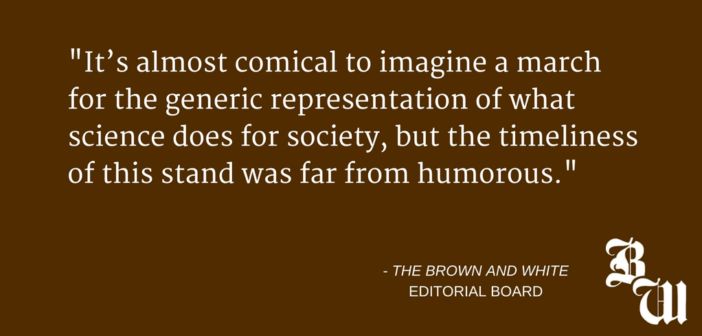It’s a tough time to fight for any cause without sounding political.
Even when organizers articulate the intention to do so, it is apparent the polarized sphere surrounding Washington will not permit a bipartisan opinion — even more than usual.
So when Earth Day rolled around April 22 — the day it falls on every year — it was bound to escalate. A plan was implemented to make it a different experience entirely, with a central “March for Science” taking place in Washington D.C. and more than 600 peripheral marches operating worldwide.
It’s almost comical to imagine a march for the generic representation of what science does for society, but the timeliness of this stand was far from humorous.
With outrage in the scientific community erupting after President Donald Trump released his proposed budget in March, there are two reasons all of us, especially college-aged people, should care. Both of these issues coalesced into one mass of global frustration during the march.
The first and most obvious issue threatened by the budget cut was the protection of our planet. The Environmental Protection Agency have capabilities significantly reduced in nothing short of an irresponsible decision by the government.
However, the second point chanted to the heavens by irritated citizens on Earth Day was a reflection on the universality of science — one that should be bipartisan. How can it be disputed that funding science is important for progress and innovation?
Scientific breakthroughs have omnipotent effects on our world. They catalyze advancements in technology, medicine and more. The development of our society relies on long-term investments in scientific achievement.
With this future threatened, it places a greater responsibility on young scientists. Although, if we are going to be honest, it is more of a burden than a responsibility. Not only do Lehigh students have to concentrate their pursuits on academic achievement, but they also have to fight a battle against those who refuse to prioritize their future.
They are making it happen, though, with some hopefuls making the trek to City Hall to attend one of the many “satellite” marches in the name of science.
The Bethlehem rally was populated by over 500 participants. That number on its own is low, but the support in cities as large as Washington D.C. and as small as Bethlehem play an important role in creating a force that can truly be considered global.
That’s the way it should be.
It’s tempting to distrust science, or at least be skeptical of it in specific cases. Much of this is because of its constantly-evolving nature — new findings replace previous research we had believed to be true. But that doesn’t mean science is broken.
In fact, it means we need to strive further. Each time we uncover a new secret about our world — whether it be physical, chemical or astronomical — we build upon our society in a tangible way.
And the only way to do that is to invest in it. Political connotations aside, it’s something we all need to make a priority.
It’s a universal cause.





Comment policy
Comments posted to The Brown and White website are reviewed by a moderator before being approved. Incendiary speech or harassing language, including comments targeted at individuals, may be deemed unacceptable and not published. Spam and other soliciting will also be declined.
The Brown and White also reserves the right to not publish entirely anonymous comments.